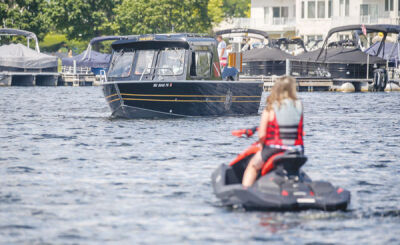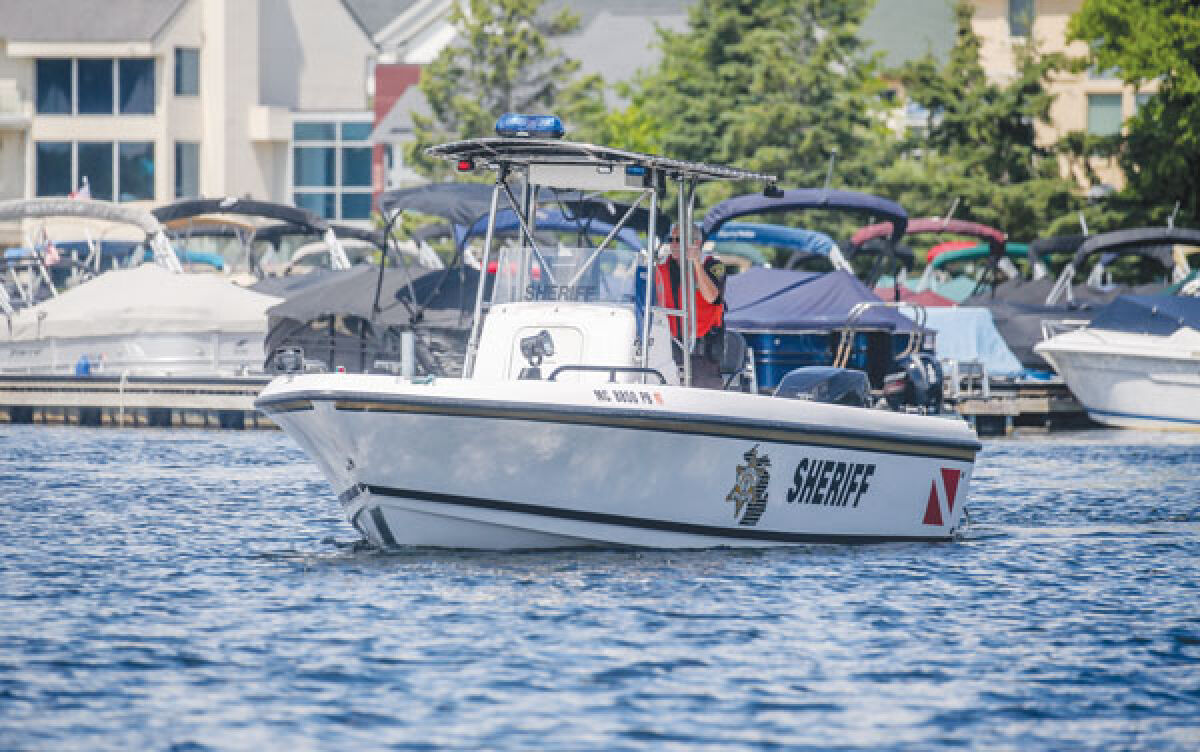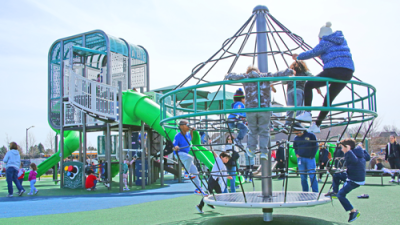
Those who venture out onto Cass Lake this year may notice more marine patrol units than in the past.
File photo by Patricia O’Blenes
KEEGO HARBOR — Keego Harbor Police Chief John Fitzgerald recently said that individuals operating a boat or personal watercraft on Cass Lake this year should be on their best behavior, as the lake will be more heavily patrolled than it has been in the past.
Aside from Keego Harbor Marine Patrol officers, the city of Keego Harbor recently entered into an agreement with the Oakland County Sheriff’s Office Marine Unit to help patrol Cass Lake.
The agreement is expected to cost approximately $15,000 for the duration of the year.
In an email, Keego City Council member Rob Kalman stated that state Rep. Brenda Carter “helped secure the grant that is paying for the patrols this summer,” with payments to the county not coming from local taxes.
“She saw that we had an issue that needed attention and acted on it,” Kalman stated.
The agreement was unanimously approved at a Keego Harbor City Council meeting May 19.
Fitzgerald said the lake will be patrolled on a random basis.
“We’re not putting hours out ahead of time; you may not know when the boat’s coming,” he said. “You will end up seeing the Keego Harbor Marine Patrol out there, the Oakland County Sheriff’s Marine Patrol, and the DNR’s marine patrol, though they’ll all be out there at different times. And it’s one of those things where some of that’s going to be random, so behave yourself on the lake at all times.”
Oakland County Sheriff Michael Bouchard provided a synopsis as to how it works when the county enters into agreements with communities for extra patrol services.
“We have 450 navigable lakes in Oakland County; obviously, we can’t be on all of them, so some lakes and homeowners association communities want a more dedicated, consistent coverage, rather than occasional patrols,” Bouchard said. “So we created a system where they can contract through their communities with the Sheriff’s Office to get more hours, if you will, (for) patrol on their lakes, and we’ve had 19 lakes do that. For the other lakes, we patrol periodically, and then we always have emergency response for all of the waters, capable and ready.”
Bouchard discussed the advantage of having extra patrol services on the lakes.
“It’s the difference between, let’s say, a room full of kids that are ready to get out of school for the summer — having a teacher in the classroom, or being left alone in the classroom. Without any supervision, it tends to sometimes get a little rowdy,” he said. “The same thing happens on the lake — rowdy, in terms of noise, and sometimes complaints about how people are piloting their watercraft. Having a marked sheriff patrol watercraft on a lake tends to diminish those issues, No. 1, and No. 2, if they occur, put a quick stop to it.”
Keego Mayor John Fletcher discussed some of the issues that have been taking place on Cass Lake.
“I think common courtesy went out the window,” he said. “How loud do you need your stereo when you’re standing on the back of your boat? Do you need it so you rattle windows on the house? There’s so many problems, and I think inconsideration is one of the biggest problems, so law enforcement — it makes a difference. When they’re out there, things calm down. (When) they’re not, it goes nuts.”
One of the prime areas of concern for local residents has been the Cass Lake sandbar.
“I’ve said it for years, that Keego Harbor’s population more than doubles on the weekend, and they’re all standing in the sandbar, throwing their trash in the water, urinating, going to the bathroom — pets in the water,” Fletcher said. “It’s actually — it’s pretty nasty.”
After entering into an agreement with Keego Harbor, Oakland County helped patrol Cass Lake on Memorial Day weekend, and Fletcher noticed a difference.
“It gets crazy out there, but I do think the Sheriff’s Department is the right solution to this problem,” Fletcher said. “Everything involved with them has been so great, and they performed fantastic this past weekend.”
As for how many patrol boats people can expect to see on Cass Lake, Fitzgerald isn’t tipping his hand.
“I’m just going to leave it at, we’re planning on having more patrol than we’ve had in the past,” he said.
Fitzgerald discussed a few of the primary issues that have been reported.
“Amongst boats that are anchored and enjoying the sandbar area, loud music is probably the biggest one that we’d like to have settled down a bit,” he said. “And occasionally, it’s people who try to enter or take off from that sandbar area at too high a speed — that’s putting other people at risk. Then, as you get further out on the lake, it’s speed violations, personal watercraft violations.”
Although boats are the primary means of travel on Cass Lake, from Fitzgerald’s perspective, they are not the biggest source of problems.
“I’m going to say there’s usually more boats out there, but the Jet Skis tend to be more dangerous because most of the boats are the pontoon boats that are larger — people see them,” he said. “The Jet Skis … those operators tend to be more reckless, more daring, and they can end up causing some serious problems.”
Aside from adhering to Cass Lake’s 50 mph speed limit, Fitzgerald also shared other safety tips people should be aware of before heading out on the water.
“Being aware of no wake within a hundred feet of swimmers, other anchored boats, shorelines and docks — boating and drinking. You (have) to be very careful about that one. You’re allowed to have a beverage on the boat, but you can’t be intoxicated and operating,” Fitzgerald said. “It’s going to cost you like it would if you were caught drunk driving; it could cost you up to $10,000.”
According to a press release from Oakland County, alcohol use is the leading known contributing factor in fatal boating accidents when the primary cause is known.
“If you analyze accidents and drownings, a huge percentage of them have a correlation with people drinking or having drugs in their system,” Bouchard said.
The release from Oakland County states that, in 2021, the Oakland County Sheriff’s Office Marine Unit responded to six drownings and two near drownings.
More than 85% of the people who drowned in a recreational boating accident were not wearing a life jacket, according to the release.
“We know that people oftentimes are reluctant to wear a personal flotation device, but we know they save lives, because what happens is that you may come across a wake at a different angle, or if, heaven forbid, you have a collision and you end up in the water, most people that end up in the water with some kind of boating emergency don’t plan on being there,” Bouchard said. “If they don’t have their flotation device on, it doesn’t do them any good. … (If) you hit your head, you may not be capable of swimming.”
Bouchard pointed out another reason why it is a good idea to wear a personal flotation device.
“If you’re drinking and partying and decide to take a swim, know that your capabilities to swim may be vastly impaired,” he said. “And so maybe the smart thing to do is put on a flotation device before you get in the water if you’ve been drinking a lot so that you don’t run into a situation that can be dangerous, because unfortunately, we’ve recovered numerous drowning victims that had been drinking, having a good time partying (and) weren’t driving the watercraft. … The sun focused on your system — magnifies the impact of the alcohol. They don’t have the ability to swim like they thought they did or could, and they quickly go under the water and drown.”
Bouchard offered more safety tips for those looking to enjoy some time out on the lake.
“The first thing we encourage people to do is to do a very detailed analysis of their watercraft — their boat, their fuel lines, their fuel injection system, their motor, their lights, their horns, their safety equipment that’s built into their watercraft, if any, and then an examination of whatever kind of safety equipment is contained inside the boat, like a personal flotation device, an air horn or whatever kinds of things you keep — a medical kit, throw-ball flotation rescue capability on a rope if somebody’s in the water and you need to throw them something to help them, all those things,” Bouchard said. “Fix whatever needs to be fixed or make sure that it’s there. … Do an inventory check, and a parts and equipment check. That’s the first steps.”
As for specific rules pertaining to Cass Lake, Fitzgerald also pointed out that people can’t come within 200 feet of a “diver-down” flag, which is a white flag with a red line through it.
He added that all boats should be going in a counterclockwise motion around the lake and that it is a violation not to do so.
Throwing things in the water and objects that blow off of a boat can also lead to a ticket.
Fitzgerald said that, after dusk, it is “back to a slow operation” on Cass Lake.
“You have to have the proper lighting on your boat so other boats can see you,” he said. “That’s when some of the worst things happen, is when somebody doesn’t have lights on their boat and they have collisions after dark. Have a fire extinguisher on your boat. … Boats tend to be very flammable if they have an incident.”
Like Bouchard, Fitzgerald also said that having the proper personal flotation devices on board is a “big safety thing.”
“If something happens and somebody gets knocked off a boat, you want to be able to toss them a light ring, a float or something to help them out,” Fitzgerald said.
Fitzgerald shared a message for those who let other people operate their personal watercraft.
“You’re responsible for your personal watercraft, and the people you are allowing to use it need to be properly certified … which is especially your kids and their friends,” he said. “You can be liable for accidents they (cause) if they’re using your equipment in (an) unsafe manner and are not certified to be taking it out on the lake.”
From Fitzgerald’s perspective, “it’s very easy” to not have safety issues arise on Cass Lake.
“Follow the rules that are out there, and we’ll have no problems,” he said. “We want everybody to enjoy the lake, we want everybody to have a good time, we want everybody to get their tan, enjoy some music, enjoy their friends, and have no one get hurt. And we’d like to not have to write a ticket all summer. … All it takes is cooperation between people respecting other people’s rights; that’s how easy it is to not have any violations.”
 Publication select ▼
Publication select ▼



























